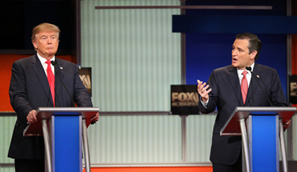
The Two Minutes Hate against Ted Cruz for his “New York values” comment is now stretching into a week. Never mind that Cruz, speaking at last week’s Republican presidential debate, was quoting Donald Trump’s own claims that he was open to legalizing gay marriage (long before most Democrats were)—and supported both gays in the military and partial-birth abortion— because of his “New York background.” As Trump put it in a 1999 interview: “I’ve lived in New York City and Manhattan all my life . . . so my views are a little bit different [than] if I lived in Iowa.” Some Republicans, like Larry Kudlow and Long Island congressman Peter King, joined in the Cruz criticism; Kudlow even invoked the specter of anti-Semitism. Well, here’s one half-Jewish, Marco Rubio-supporting, New York Republican—with politics closer to Peter King’s than to Ted Cruz’s—who doesn’t buy it.
The spin from Cruz critics and Trump himself is that the Texas senator somehow impugned the heroism of the New York cops and firefighters who risked their lives on 9/11. There’s no denying that Trump played this angle brilliantly at the GOP debate, and that Cruz was uncharacteristically unprepared. But everyone knows or should know that Cruz wasn’t talking about the values of the NYPD or FDNY—or of people in Queens, Staten Island, or Levittown. He was talking about the “New York values” of the liberal Manhattan elites who look down their noses at cops and firemen—and at Peter King. In speaking of those whose values are “socially liberal” but also “focus around money and the media,” Cruz obviously wasn’t targeting the working stiffs in New York’s own version of flyover country, but rather the powerful who helicopter above them en route from “the city” to the Hamptons.
Finally, a reason to check your email.
Sign up for our free newsletter today.
In other words, Cruz was making a populist appeal, taking on an establishment perceived as at once culturally revolutionary and economically royalist. What better shorthand for the worldview of this elite than “Manhattan values,” or, more loosely, “New York values?” Of course, Cruz opened himself up to charges of hypocrisy. He’s raised money from Wall Street, his wife worked for Goldman Sachs, and his economic policy proposals, unlike Trump’s, are quite popular in the boardrooms.
Many of Cruz’s Republican critics are Northeast urbanites, and their condemnations sometimes crossed into a condescending putdown of the “boob vote” that Cruz is said to be courting. This hint of class bias—ironically reflective of many of the attacks on Trump for his appeal to the same working-class voters—was in many ways more forthcoming than the cops-and-firemen routine. Conservatism has a strong and defensible anti-populist tradition. This attitude holds that the most talented people—those who gravitate to cities and who rise to positions of power on Wall Street or become trustees of the Metropolitan Museum of Art—should run the country. But going back at least as far as William F. Buckley’s contention that he’d rather be governed by the first 2,000 names in the Boston phonebook than by Harvard’s faculty, a countervailing strain of conservative populism has gained strength. The “talented” people, on this thinking, have gotten all the big things wrong, and in doing so, they’ve increasingly driven “ordinary” people into the conservative ranks.
Count me among these populist conservatives. I’ve been loathe to join in bashing Trump, and I’m equally reluctant to join the Cruz bashers now. Conservative anti-populists are free to differ, of course, but they should come out and make their case frankly instead of casting themselves as defenders of the September 11 heroes.